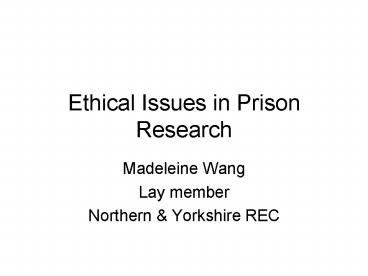Ethical Issues in Prison Research - PowerPoint PPT Presentation
1 / 17
Title:
Ethical Issues in Prison Research
Description:
RECs are required to provide independent, competent and timely review ... Are burdens and harms avoided or minimised? Vulnerable or sick patients, young people ... – PowerPoint PPT presentation
Number of Views:271
Avg rating:3.0/5.0
Title: Ethical Issues in Prison Research
1
Ethical Issues in Prison Research
- Madeleine Wang
- Lay member
- Northern Yorkshire REC
2
Ethical issues in prison health research
- RECs guiding principles
- The researchers role and responsibilities
- The research
- The participants welfare and safety in research
- Avoiding and managing risks
- Facilitating valid consent
- Safeguarding confidentiality
3
Health service research ethics committees (RECs)
- RECs are required to provide independent,
competent and timely review of health related
research submitted to it for its approval, in
respect of its ethical acceptability and relevant
laws, regulations and guidance. - RECs duties are to protect participants from
harm and, secondly, to facilitate good quality
research. - Each application is treated according to the same
principles and standards of ethical review
4
The researcher
- A REC looks for evidence that the researcher
- Has adequate levels of knowledge and expertise?
- Has appropriate supervision and support?
- Is able to demonstrate that the research is worth
doing? - And that the results are likely to lead to a
tangible benefit.
5
The researcher
- The REC needs to be satisfied that
- The researcher is competent to undertake research
in the prison environment, - Or
- the research is part of an educational
qualification and - the researcher has appropriate clinical and
academic supervision in place.
6
The research questions RECs consider
- Is the proposed research intended to benefit the
target population and or society as a whole? - Is the study design scientifically sound?
- Does the study have the required approvals,
sponsorship, funding and indemnity arrangements
in place? - It is unethical to conduct poorly designed
research - Research must be able to fulfil its intended
purpose and lead to a tangible benefit
7
Selection and recruitment of participants
- Some potential participants are more vulnerable
than others - Status, category and health status of prisoner
- Other potential participants might be involved
- Staff, relatives, children
- Is the setting appropriate for interviews,
investigations or treatment? - Hospital, clinic, prison environment
- Will participants (and researchers) be secure and
safe?
8
REC considerations of participants welfare
- Will the researcher uphold participants personal
autonomy? - Respect for dignity, privacy, confidentiality,
redress etc - Are burdens and harms avoided or minimised?
- Vulnerable or sick patients, young people
- Loss of earnings, of personal time and breeches
of confidentiality
9
Risks to participants
- Anxiety and distress may be caused by
- in depth questioning and exposure of sensitive
personal information - Inappropriate identification of participants
- confidentiality breeches in published papers
- Exploitation often results from
- Coercion, inducements and manipulation
- Participant/researcher relationship is
jeopardised if - Conflicts arise from a dependant or unequal
relationship
10
Risks to participants
- Strategies for reducing risk of harm include
- Ensuring scientific robustness of the study
- Knowing rules and regulations within the prison
environment. - Clarifying with participants, issues of
confidentiality and when to report - Provision of advocacy services
- Avoiding and minimising conflicts of interest in
relationships
11
Risks to participants 2
- Considering consent as a process and not a one
off event - Keeping to the rules regarding pay and reward for
research participation - Organising follow-up care where appropriate
- E.g. During and at the end of the study
- Managing data anonymity in publications
12
Consent and literacy
- Informed consent is a prerequisite for all
research involving identifiable subjects - Literacy is the degree to which individuals have
the capacity to obtain, process, and understand
research information needed to make appropriate
informed decisions about whether to participate - Comprehension of information may be impaired by a
multitude of factors including language, culture,
education level, mental and emotional state,
situation and age.
13
Consent and literacy
- RECs look for
- all necessary information presented in simple,
clear, plain language. - Researchers should also evaluate whether
individual participants have understood the
information. - Evidence of an adequate consent process
- more time and effort for potential participants
whose literacy is compromised. - Where appropriate, evidence of information
provision in different formats.
14
Consent
- Is the right person in the right place at the
right time? - Is a competent person taking consent?
- Does participant have an opportunity to ask
questions and have them answered? - Contact name telephone number
- Is he/she informed of the risks involved?
- Is she/he able to discuss with others and
reflect? - Advocate, health professional, family member,
friend - Are participants freed to withdraw without bad
consequences?
15
Confidentiality
- Participants must be informed of any risks of
disclosure of information and that rules apply
differently in different situations - E.g.
- Prisoners
- Family members
- children
- Permissions must be sought for use of quotations
in publications
16
And finally
- "Prisoners should have the same range and quality
of healthcare as the public receives from the
NHS", HMPS/NHS, 1999 - therefore it is only just and fair that
- Prisoners should have the same range and quality
of healthcare research as the public receives
from the NHS.
17
Thank you for listening
- Any questions?































